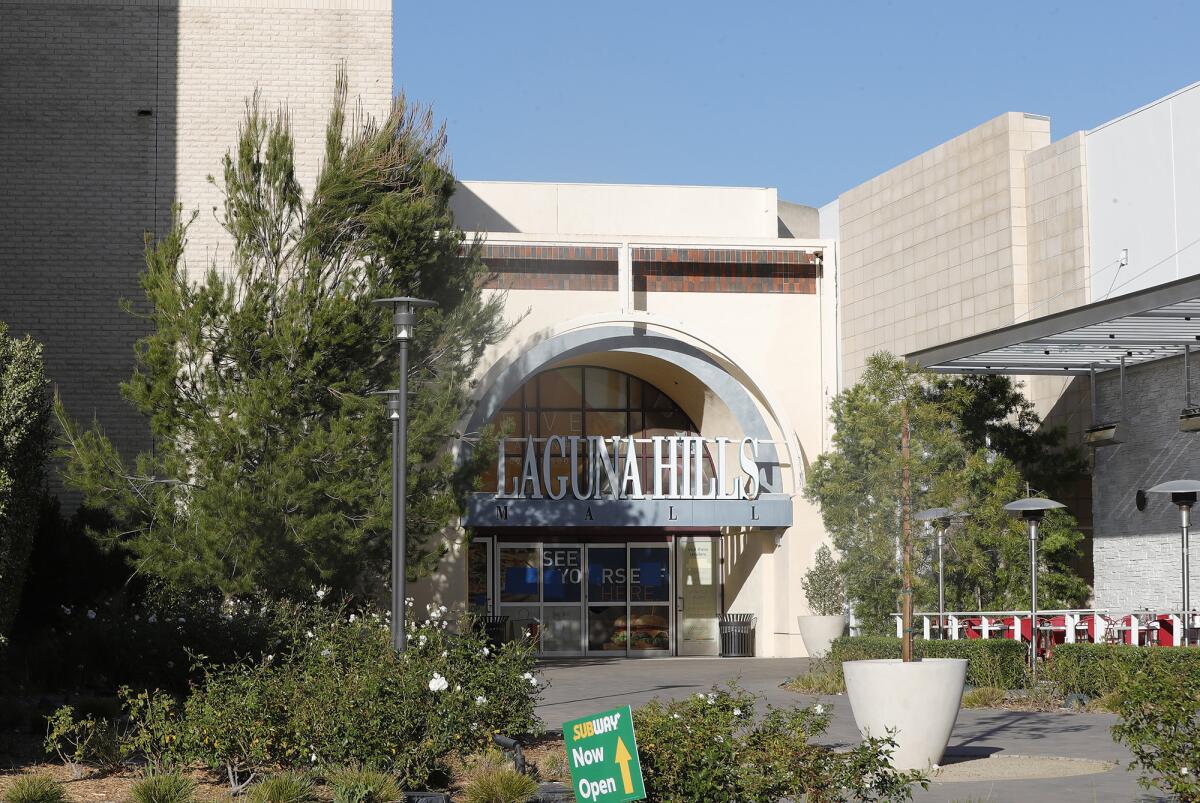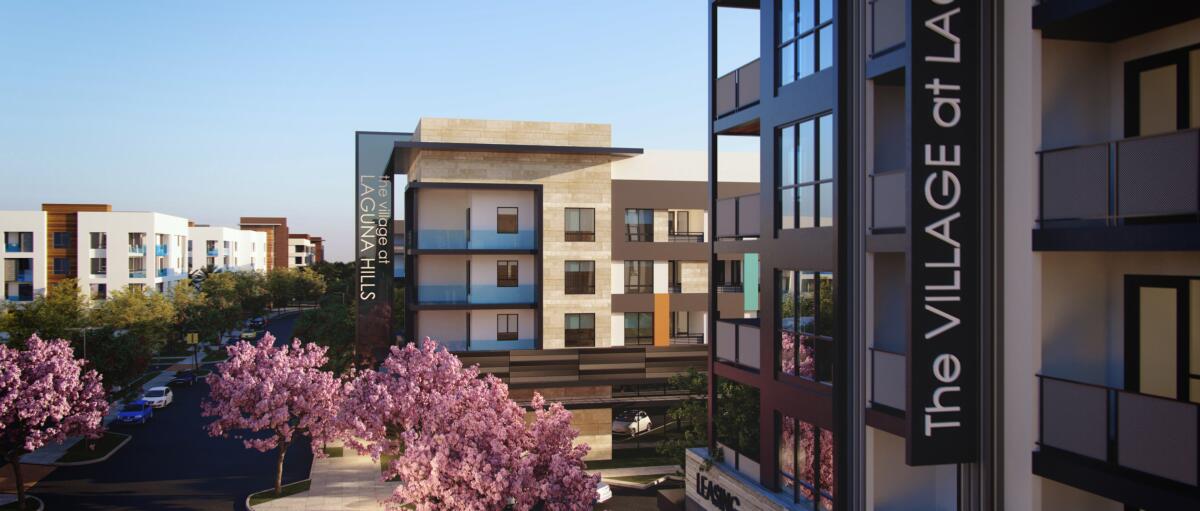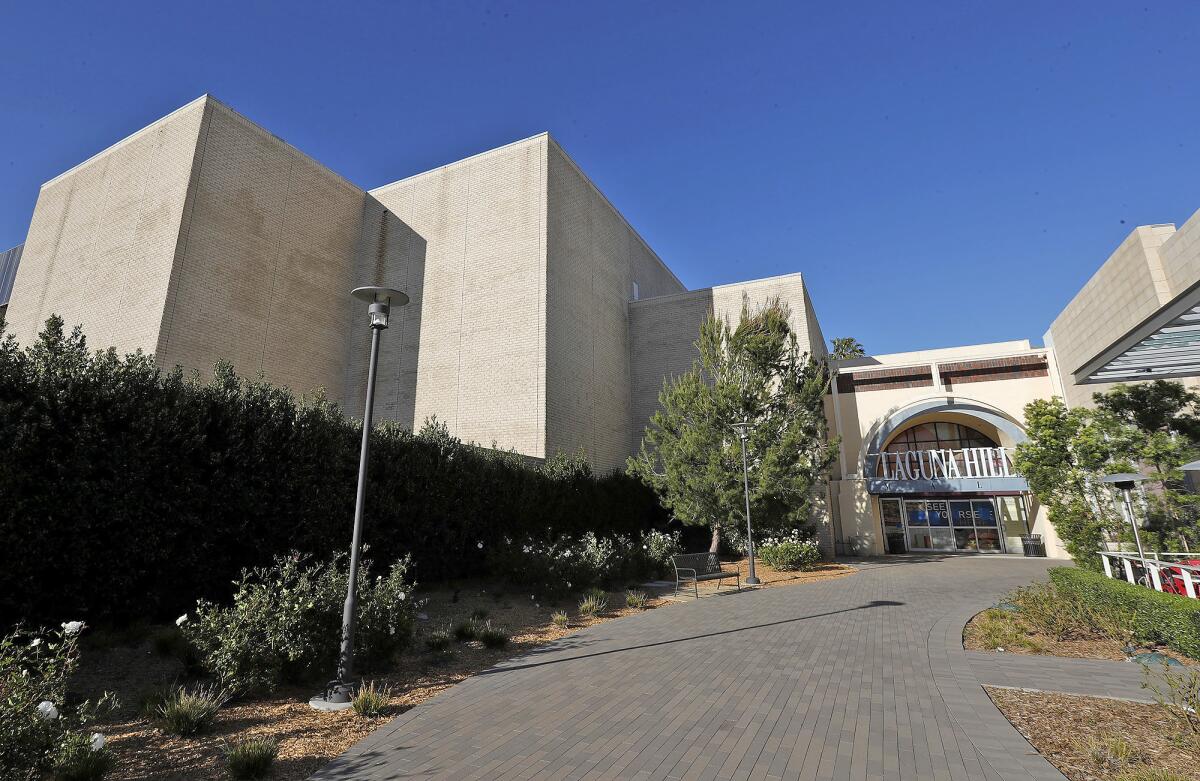Laguna Hills narrowly approves plan to transform mall into housing, retail and hotel site

- Share via
After several years and revamped plans, Laguna Hills City Council declared that it would take a “Village” to raze an aging mall.
Last week, a council majority approved a development agreement for the Village at Laguna Hills, a project aiming to transform the 68-acre site off the 5 Freeway where the Laguna Hills Mall welcomed shoppers for decades into a mixed-use development featuring 1,500 apartment units, retail outlets, professional office space, a community park and a hotel.
“We want to build this project,” said Stephen Logan, vice president of development for Merlone Geier Partners, during the March 8 City Council meeting. “We’re eager to go get it built.”
The Village at Laguna Hills wouldn’t be the San Diego-based retail developer’s first foray into reimagining the mall property it acquired in 2013.
Six years ago, council members dug their ceremonial shovels into the soil of 5 Lagunas, a $260-million plan to replace the mall with an indoor-outdoor shopping center and housing development.
The original 5 Lagunas project called for about 60 retailers to join JCPenney and Macy’s, the mall’s old anchors; the blueprint also included demolishing a Sears building to make way for luxury apartments.
But then the traditional department stores departed, and more vacancies followed.
Merlone Geier Partners halted construction of 5 Lagunas in 2017 and modified its plans.
After the city contracted a private negotiator and formed an ad hoc committee with Mayor Dave Wheeler and Mayor Pro Tem Janine Heft in September 2021, the Village at Laguna Hills finally arrived before council for a vote.
The revised plan significantly slashed the area reserved for retail and entertainment from the original 5 Lagunas project. It also added more housing, including 100 moderate and 100 low-income units, and a hotel.
Not much debate at council surrounded the traditional mall’s retail glory days being long past.
Instead, public criticism focused on calling out an uneven advancement on the city’s Regional Housing Needs Allocation numbers.
“I’m saddened to hear that there’s been no change in the original number of low-income units,” said Ann Owens, outreach coordinator for Welcoming Neighbors Home. “This is a major missed opportunity for the city to meet its RHNA requirements.”

Community Development Director Larry Longenecker stated in an email to TimesOC that the Village at Laguna Hills will account, at a minimum, for 46% of the city’s RHNA numbers.
“Based on the size of some of the units, including some very small studios and small 1-bedroom units, it is anticipated that market rates for those smaller units will fall into the moderate, and possibly even the low-income categories,” he wrote, “such that a larger percentage of the project units will be affordable and satisfy more than the 910 RHNA units reported.”
The city still needs to incorporate 568 very low-income units into its 2021-29 Housing Element; the Village at Laguna Hills doesn’t contribute anything at that affordability level.
Apart from housing, the project’s supporters pointed to the project as a source of economic revitalization that would generate much-needed revenue for city services.
“As we emerge from this global pandemic, South Orange County is situated to be a leader and an incubator for job growth here,” said Victoria Hernandez, executive director of the South Orange County Economic Coalition. “As people have presented, this is going to create 8,000 more jobs in retail, entertainment, construction and many other areas.”
From the dais, Wheeler opposed the project on multiple fronts.
The mayor claimed it would negatively impact traffic along El Toro Road and didn’t fit the requirements of the Urban Village Specific Plan. Wheeler also criticized the housing development, which added 512 more units to the original plan, a boost he claimed would almost double the number of apartments in Laguna Hills alone.
And while the additional units will help the city advance on its RHNA requirements, the mayor argued that the Village at Laguna Hills only selected from the “cream” categories before putting the question to developers.
“The city does not have an inclusionary housing requirement in their zoning code,” Logan said. “As part of our negotiation with the development agreement ... what we gave back was 200 of the 512 for an affordability component.”
Council members supportive of the project touted key “city benefits” that were negotiated to ensure the Village at Laguna Hills would be a good bet for the local economy, chief among them the hotel‘s completion before the construction of all residential units.
“The hotel is the principal generator of revenue in this new program,” Councilman Don Sedgwick said. “Without it, I don’t think that this project would be viable.”

Wheeler further argued that the city was poised to make a decision based on an “anomaly” of pandemic economics.
“The mall, not even at its height, made about $1.5-million of our retail tax and that was 36%,” he said. “That is gone. Even when the project is completed, we will not have that money back.”
At the time Merlone Geier Partners bought the mall, its sales tax revenue had trended downward since the 2006-07 fiscal year, according to city records; the developer also submitted another “Village” proposal last year to add 1,300 apartments and townhomes to the fledging Buena Park Mall.
Heft countered her ad hoc committee colleague by arguing that mall culture and strong revenues generated by it are nostalgic, at best.
“I’m kind of an ’80s girl, and I remember the days of going to the mall with your girlfriends,” she said. “We’d all love that back, but like it’s been said by colleagues, that’s unfortunately not reality anymore.”
At the end of a lengthy debate, council voted 3-2 to pass the development agreement with Wheeler and Councilwoman Erica Pezold dissenting.
“I’m hoping that the future is going to look bright, again,” Heft said. “We’re looking to make sure we’re doing everything we can to make this a successful project.”
All the latest on Orange County from Orange County.
Get our free TimesOC newsletter.
You may occasionally receive promotional content from the Daily Pilot.




